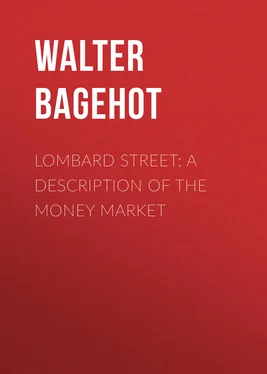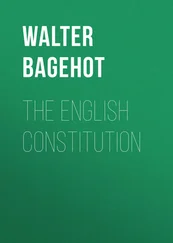Walter Bagehot - Lombard Street - A Description of the Money Market
Здесь есть возможность читать онлайн «Walter Bagehot - Lombard Street - A Description of the Money Market» — ознакомительный отрывок электронной книги совершенно бесплатно, а после прочтения отрывка купить полную версию. В некоторых случаях можно слушать аудио, скачать через торрент в формате fb2 и присутствует краткое содержание. Жанр: foreign_prose, История, foreign_edu, foreign_antique, на английском языке. Описание произведения, (предисловие) а так же отзывы посетителей доступны на портале библиотеки ЛибКат.
- Название:Lombard Street: A Description of the Money Market
- Автор:
- Жанр:
- Год:неизвестен
- ISBN:нет данных
- Рейтинг книги:4 / 5. Голосов: 1
-
Избранное:Добавить в избранное
- Отзывы:
-
Ваша оценка:
- 80
- 1
- 2
- 3
- 4
- 5
Lombard Street: A Description of the Money Market: краткое содержание, описание и аннотация
Предлагаем к чтению аннотацию, описание, краткое содержание или предисловие (зависит от того, что написал сам автор книги «Lombard Street: A Description of the Money Market»). Если вы не нашли необходимую информацию о книге — напишите в комментариях, мы постараемся отыскать её.
Lombard Street: A Description of the Money Market — читать онлайн ознакомительный отрывок
Ниже представлен текст книги, разбитый по страницам. Система сохранения места последней прочитанной страницы, позволяет с удобством читать онлайн бесплатно книгу «Lombard Street: A Description of the Money Market», без необходимости каждый раз заново искать на чём Вы остановились. Поставьте закладку, и сможете в любой момент перейти на страницу, на которой закончили чтение.
Интервал:
Закладка:
The result is that we have placed the exclusive custody of our entire banking reserve in the hands of a single board of directors not particularly trained for the duty—who might be called 'amateurs,' who have no particular interest above other people in keeping it undiminished—who acknowledge no obligation to keep it undiminished who have never been told by any great statesman or public authority that they are so to keep it or that they have anything to do with it who are named by and are agents for a proprietary which would have a greater income if it was diminished, who do not fear, and who need not fear, ruin, even if it were all gone and wasted.
That such an arrangement is strange must be plain; but its strangeness can only be comprehended when we know what the custody of a national banking reserve means, and how delicate and difficult it is.
II
Such a reserve as we have seen is kept to meet sudden and unexpected demands. If the bankers of a country are asked for much more than is commonly wanted, then this reserve must be resorted to. What then are these extra demands? and how is this extra reserve to be used? Speaking broadly, these extra demands are of two kinds—one from abroad to meet foreign payments requisite to pay large and unusual foreign debts, and the other from at home to meet sudden apprehension or panic arising in any manner, rational or irrational.
No country has ever been so exposed as England to a foreign demand on its banking reserve, not only because at present England is a large borrower from foreign nations, but also (and much more) because no nation has ever had a foreign trade of such magnitude, in such varied objects, or so ramified through the world. The ordinary foreign trade of a country requires no cash; the exports on one side balance the imports on the other. But a sudden trade of import like the import of foreign corn after a bad harvestor (what is much less common, though there are cases of it) the cessation of any great export, causes a balance to become due, which must be paid in cash.
Now, the only source from which large sums of cash can be withdrawn in countries where banking is at all developed, is a 'bank reserve.' In England especially, except a few sums of no very considerable amount held by bullion dealers in the course of their business, there are no sums worth mentioning in cash out of the banks; an ordinary person could hardly pay a serious sum without going to some bank, even if he spent a month in trying. All persons who wish to pay a large sum in cash trench of necessity on the banking reserve. But then what is 'cash?' Within a country the action of a Government can settle the quantity, and therefore the value, of its currency; but outside its own country, no Government can do so. Bullion is the cash' of international trade; paper currencies are of no use there, and coins pass only as they contain more or less bullion.
When then the legal tender of a country is purely metallic, all that is necessary is that banks should keep a sufficient store of that 'legal tender.' But when the 'legal tender' is partly metal and partly paper, it is necessary that the paper 'legal tender'—the bank note—should be convertible into bullion. And here I should pass my limits, and enter on the theory of Peel's Act if I began to discuss the conditions of convertibility. I deal only with the primary pre-requisite of effectual foreign payments—a sufficient supply of the local legal tender; with the afterstep—the change of the local legal tender into the universally acceptable commodity cannot deal.
What I have to deal with is, for the present, ample enough. The Bank of England must keep a reserve of 'legal tender' to be used for foreign payments if itself fit, and to be used in obtaining bullion if itself unfit. And foreign payments are sometimes very large, and often very sudden. The 'cotton drain,' as it is called—the drain to the East to pay for Indian cotton during the American Civil War took many millions from this country for a series of years. A bad harvest must take millions in a single year. In order to find such great sums, the Bank of England requires the steady use of an effectual instrument.
That instrument is the elevation of the rate of interest. If the interest of money be raised, it is proved by experience that money does come to Lombard Street, and theory shows that it ought to come. To fully explain the matter I must go deep into the theory of the exchanges, but the general notion is plain enough. Loanable capital, like every other commodity, comes where there is most to be made of it. Continental bankers and others instantly send great sums here, as soon as the rate of interest shows that it can be done profitably. While English credit is good, a rise of the value of money in Lombard Street immediately by a banking operation brings money to Lombard Street. And there is also a slower mercantile operation. The rise in the rate of discount acts immediately on the trade of this country. Prices fall here; in consequence imports are diminished, exports are increased, and, therefore, there is more likelihood of a balance in bullion coming to this country after the rise in the rate than there was before.
Whatever persons—one bank or many banks—in any country hold the banking reserve of that country, ought at the very beginning of an unfavourable foreign exchange at once to raise the rate of interest, so as to prevent their reserve from being diminished farther, and so as to replenish it by imports of bullion.
This duty, up to about the year 1860, the Bank of England did not perform at all, as I shall show farther on. A more miserable history can hardly be found than that of the attempts of the Bank—if indeed they can be called attempts—to keep a reserve and to manage a foreign drain between the year 1819 (when cash payments were resumed by the Bank, and when our modern Money Market may be said to begin) and the year 1857. The panic of that year for the first time taught the Bank directors wisdom, and converted them to sound principles. The present policy of the Bank is an infinite improvement on the policy before 1857: the two must not be for an instant confounded; but nevertheless, as I shall hereafter show, the present policy is now still most defective, and much discussion and much effort, will be wanted before that policy becomes what it ought to be.
A domestic drain is very different. Such a drain arises from a disturbance of credit within the country, and the difficulty of dealing with it is the greater, because it is often caused, or at least often enhanced, by a foreign drain. Times without number the public have been alarmed mainly because they saw that the Banking reserve was already low, and that it was daily getting lower. The two maladies—an external drain and an internal—often attack the money market at once. What then ought to be done?
In opposition to what might be at first sight supposed, the best way for the bank or banks who have the custody of the bank reserve to deal with a drain arising from internal discredit, is to lend freely. The first instinct of everyone is the contrary. There being a large demand on a fund which you want to preserve, the most obvious way to preserve it is to hoard it—to get in as much as you can, and to let nothing go out which you can help. But every banker knows that this is not the way to diminish discredit. This discredit means, 'an opinion that you have not got any money,' and to dissipate that opinion, you must, if possible, show that you have money: you must employ it for the public benefit in order that the public may know that you have it. The time for economy and for accumulation is before. A good banker will have accumulated in ordinary times the reserve he is to make use of in extraordinary times.
Ordinarily discredit does not at first settle on any particular bank, still less does it at first concentrate itself on the bank or banks holding the principal cash reserve. These banks are almost sure to be those in best credit, or they would not be in that position, and, having the reserve, they are likely to look stronger and seem stronger than any others. At first, incipient panic amounts to a kind of vague conversation: Is A. B. as good as he used to be? Has not C. D. lost money? and a thousand such questions. A hundred people are talked about, and a thousand think,—'Am I talked about, or am I not?' 'Is my credit as good as it used to be, or is it less?' And every day, as a panic grows, this floating suspicion becomes both more intense and more diffused; it attacks more persons; and attacks them all more virulently than at first. All men of experience, therefore, try to strengthen themselves,' as it is called, in the early stage of a panic; they borrow money while they can; they come to their banker and offer bills for discount, which commonly they would not have offered for days or weeks to come. And if the merchant be a regular customer, a banker does not like to refuse, because if he does he will be said, or may be said, to be in want of money, and so may attract the panic to himself. Not only merchants but all persons under pecuniary liabilities—present or imminent—feel this wish to 'strengthen themselves,' and in proportion to those liabilities. Especially is this the case with what may be called the auxiliary dealers in credit. Under any system of banking there will always group themselves about the main bank or banks (in which is kept the reserve) a crowd of smaller money dealers, who watch the minutae of bills, look into special securities which busy bankers have not time for, and so gain a livelihood. As business grows, the number of such subsidiary persons augments. The various modes in which money may be lent have each their peculiarities, and persons who devote themselves to one only lend in that way more safely, and therefore more cheaply. In time of panic, these subordinate dealers in money will always come to the principal dealers. In ordinary times, the intercourse between the two is probably close enough. The little dealer is probably in the habit of pledging his 'securities' to the larger dealer at a rate less than he has himself charged, and of running into the market to lend again. His time and brains are his principal capital, and he wants to be always using them. But in times of incipient panic, the minor money dealer always becomes alarmed. His credit is never very established or very wide; he always fears that he may be the person on whom current suspicion will fasten, and often he is so. Accordingly he asks the larger dealer for advances. A number of such persons ask all the large dealers—those who have the money—the holders of the reserve. And then the plain problem before the great dealers comes to be 'How shall we best protect ourselves? No doubt the immediate advance to these second-class dealers is annoying, but may not the refusal of it even be dangerous? A panic grows by what it feeds on; if it devours these second-class men, shall we, the first class, be safe?'
Читать дальшеИнтервал:
Закладка:
Похожие книги на «Lombard Street: A Description of the Money Market»
Представляем Вашему вниманию похожие книги на «Lombard Street: A Description of the Money Market» списком для выбора. Мы отобрали схожую по названию и смыслу литературу в надежде предоставить читателям больше вариантов отыскать новые, интересные, ещё непрочитанные произведения.
Обсуждение, отзывы о книге «Lombard Street: A Description of the Money Market» и просто собственные мнения читателей. Оставьте ваши комментарии, напишите, что Вы думаете о произведении, его смысле или главных героях. Укажите что конкретно понравилось, а что нет, и почему Вы так считаете.












